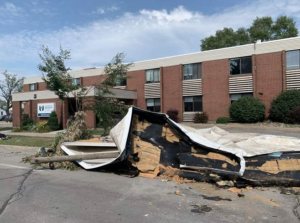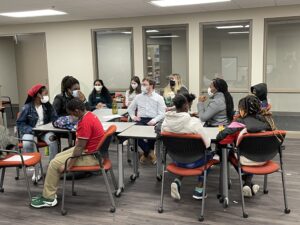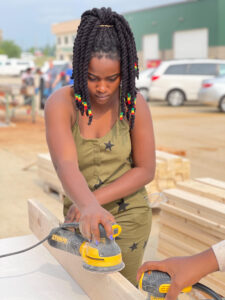(Originally Published in the Gazette on August 25th, 2021)
Author: Paula Land, Executive Director of CMC
Last August’s derecho brought an influx of donations and volunteer support to local human service agencies, many that look different today after expanding services and resources to support ongoing disaster recovery efforts. While the immediate disaster is in the past, major community needs persist. And as the upcoming school year approaches, new needs will arise and local agencies that are taking action still need your support.
At the Catherine McAuley Center (CMC), for one, there was a clear need for emergency housing after the derecho, which led us to not only open a temporary shelter for refugees and immigrants, but to also provide ongoing disaster case management and other services to shelter residents. As additional needs were discovered, CMC added more services.
Another critical need resurfaced in the midst of the derecho and pandemic — the expectation for refugee and immigrant youth to return to online learning in the new school year. These students were still learning English, had limited access to WiFi or computers, or little experience navigating online assignments and instruction. Their parents, also English language learners, were not able to guide them through their lessons.
Days before the school year started, CMC case managers began checking in with families and learned that most didn’t have the resources available to attend school online. Families were welcomed to join the other students at the temporary shelter for the start of classes, but with limited space and bandwidth, a separate location for online learning was crucial.
That’s when CMC transitioned the one undamaged wing of the Catherine McAuley Center’s new building into a temporary school for students to attend classes online. Word spread quickly, and before long 45 ELL students from local elementary, middle, and high schools were logging on for their classes from CMC. The temporary school offered classrooms, computer labs, interpreters, culturally familiar food, and direct support from CMC staff and local teachers from September through November.
But even after Cedar Rapids schools resumed in-person classes, the ELL students who had been receiving individual support at CMC lacked the after-school support that directly addressed the needs of English language learners. Because CMC case managers built strong connections with students in the temporary school, and with expertise in meeting the needs of refugees and immigrants, CMC expanded on an earlier summer program and launched a long-term after-school program, LIFE (Learning Is For Everyone).
Through the LIFE program, students meet weekly at CMC to receive support with homework and class assignments, reinforcing what they’re learning in school. Balanced with a strong desire to learn English, students come to CMC to build relationships and make deeper connections in the community. In this upcoming school year, LIFE will continue to grow, meeting twice weekly for increased support, field trips, and self-discovery projects. Another big component of this school year will be engaging parents in the program, the schools, and their children’s learning.
Disaster recovery demanded the development of new resources, and the community stepped up with financial contributions, supply donations, and volunteerism – all which are essential for growth. The outpouring of generosity seen after the derecho allowed CMC to quickly expand services to meet growing needs. But just as support for online learning in the fall made way for the LIFE after-school program, these new, high demand services require ongoing support.
There are countless other examples of service growth throughout the community. Please continue investing in human service organizations that have adapted to meet ongoing needs as you did immediately after the derecho.




